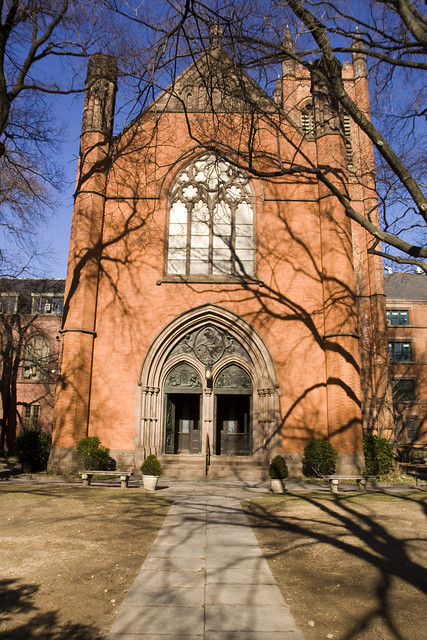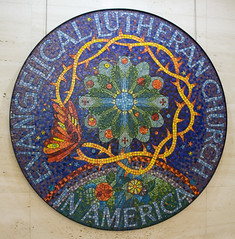My sermon from this morning, typos and all. I always forget how much of this I change on the fly – little additions here, different stresses, hand motions, etc. I think there was between 170-180 people today at church (between the two services).
======
3rd Sunday in Lent (Exodus 20:1-17;Psalm 19;1 Corinthians 1:18-25;John 2:13-22).
Advent Lutheran Church, New York City
March 11, 2012
Great Expectations: 1 Corinthians 1:18-25
We’ve got some great lessons this week, don’t we?
There’s Jesus, in the temple, throwing out the money changers – Rambo style – and then there’s Moses coming down the mountain, and delivering the ten commandments – and then we have Paul in the first letter to the Corinthians talking about the cross being a stumbling block and foolishness. And it’s that line from Corinthians that I seem to see a lot.
Earlier this week, I visited Union Seminary’s library, digging around for some old magazines – and rather than getting a stack of old paper or a pdf or computer files – the librarian went ahead and handed me these weird little boxes containing…film? And I had to go thread the film into this giant noisy machine, with levers and knobs and pulleys. And with the article displayed on this giant screen in front of me , I would cycle through the pages and it would make that noise che-che-che-che-che-che as the pages zoomed by. And I stopped, and right there, on the cover of the magazine, below the title, in big bold letters, was First Corinthians, verse 23: “we proclaim Christ crucified, a stumbling block to Jews and foolishness to Gentiles.”
In a way, that phrase is one of those rallying points for us I think. It’s a phrase we love to say, to hear, to call as our own. It’s a phrase that seems to say that God is bigger than our expectations, that God doesn’t work the way we sometimes imagine, and that God is bigger than who we imagine ourselves to be. And there’s a lot of hope in that.
And as I soaked in 1 Corinthians 23 as the sub-title for the magazine, I couldn’t help but notice the date. 1914. The same year that the hopes of the 19th century – of so much progress – the development of so many things that we take for granted now – modern medicine, the rise of the middle class, the birth of New York City, flight, industrialization, electric lights, movies, radio, and even the subway – that century where so much hope was put into the idea of progress – that magazine cover, with that verse of hope in big bold letters on it – came from the same year when all that progress – all that human ingenuity, strength, power – all those great expectations – they all came crashing down with the start of World War One.
======
1850 years, or so, before that – Paul had an issue on his hands. He had just received word that there were issues in the Corinth community. Paul had moved on, gone off to spread the gospel in a new place. And when Chloe’s people told him what was going on in Corinth, how splits were developing within the community, he felt he had to step in. So, he wrote to them. In the beginning of our letter, he lays out some ground rules. He asserts his authority as founder of the community, he works on breaking down the sides that people had started to form – with one side saying I’m on Paul’s side, the other on Apollos, the other on Christ’s – and he lays into the power of the cross and he does that by burying our trust in wisdom, signs, and miracles, saying that God’s weakness is greater than any human strength.
So why does Paul only talk about miracles, signs, and wisdom?
I mean, I think those are things we can relate to. I think those are things our brothers and sisters 100 years ago could relate to. That…trust, that the more we learn, the more we discuss, the more we share, the more we discover, the better we’ll become; the stronger we will become. That, somehow, we can out think our way out of issues, and, sure it might take awhile – but we’ll get there. We’re always improving. Our science, our morality, our education, our politics, our economy, our…progress. There’s trust there. Or maybe it’s more of a trust in ourselves, of what we can do. And, if that doesn’t work, well, hey – we go to church, we pray – God will take care of it. That’s a kind of strength.
But…there’s something missing there. And I think the Corinthians would have noticed that too because how can you, when talking about those things that are powerful, wise, the epitome of human strength – how could Paul, and us, forget about who dominated both the Greeks and the scattered Jewish People throughout the Mediterranean world? Why doesn’t Paul mention Rome?
======
I mean, in his day, and for the people of Corinth, Rome was strength – the sheer image of human might. The Greeks might have given the world philosophy, and the Chosen People brought God to the world – but both had been conquered by Rome. Both had to bend their knee to the Emperor. Both were just one of many peoples who had succumbed to the military, political, and economic might of Rome.
And Corinth itself, at this time, wasn’t a Grecian City. It had been recently destroyed by Rome and re-colonized, a few generations before, by veterans of the army. The Corinthians that Paul taught the gospel to were descendants of Rome’s military machine. And the city was built in the image of Rome and was covered in images of what it meant to be a part of Rome. It was in the air – that not only was the Roman Empire powerful, but that Rome was divinely blessed, led by a son of the gods, and Rom had the right to conquer everyone and everything. Paul’s Corinthian community, in their everyday lives, as they went to the market, or the temple, or out to the fields to work – they would’ve passed countless statues – and these statues would be of slaves, of conquered warriors, of prisoners of war, being powerless, insignificant, and weak. Some would have their bodies bent, arms behind their backs, holding up roofs and columns and towers – like this (DEMONSTRATE) – like gargoyles on some old building today but rather than monsters – they were people caught up in Rome’s might.
It’s not the Greek’s wisdom or the Jewish God that would have seem oh so powerful to the Corinthians – that’s not human strength – human strength, divine strength – that was Rome.
And this Rome was so powerful, that it took the land of Judah.
And when it met Jesus – the Son of God – who the Corinthian community claimed as divine – that Rome crucified him, like he was a common criminal, a slave. He was insignificant – a mosquito to be swatted and nothing more.
Because that was Rome’s expectation of what it meant to handle any one person who had the audacity to cause a scene in a religious center.
That person who had the audacity to bring good news to the poor, to cure the sick, to feed the hungry, to love.
That person who had the audacity to challenge the systems of expectations that we have – and Rome had – and Corinth had – about who is powerful, who is mighty, and who deserves dignity, and who deserves God’s grace and mercy.
I think the Corinthian community would have read that mention of human strength at the end of our reading – and they would have thought of Rome.
And how so very odd it is to proclaim, and teach, and talk, and believe – it that supposed insignificant man that Rome killed.
Rome’s power and belief in itself was all around them.
And, yet, that Corinthian community proclaimed the unrealistic.
As we go through Lent – we began remembering where we came – from insignificant dust – and as we walk together on the path towards Calvary –
Where we’ll see Jesus, like those statues of slaves in Corinth, his head down, his body broken –
But he won’t be bent.
Because Jesus’s arms that day weren’t bent behind his back.
They were open, nailed to the Cross, and spread as wide as they could possibly be.
For God has something else planned
Something that didn’t rest on our own powers
our own thoughts on what it means to be great, or strong, or smart, or wise
or whatever is in the air.
But, instead, Jesus’s arms are open wide
welcoming all of us –
and showing that God’s love does not depend on us.
And that its God’s expectations that have the final say
Because its through Jesus….. that Jesus Christ, crucified,
where we find exactly what it means
for us, for you……….. to be loved. Amen.
 I think, maybe, just maybe, I had my first seminary dream about General Seminary last night. I’m not sure how the dream started and I don’t think my seminary was the point of the dream at all but, there it was, hanging out. However, GTS wasn’t located where it usually is in Chelsea; nor was the entire campus there. Rather, the front of the chapel was located in my neighborhood of Washington Heights. And, not only that, it was not really a chapel anymore. It had become one of those storefronts where the merchandise spills out into the street and the entire front is covered in clothes hanging from hangers. And the front was entirely black because it was covered in cassocks. They had cassocks of all sizes! Small, large, child-size, etc. I think there was even a cassock spanx option and, I kid you not, they even had those half mannequins, the ones that are just legs but have some extra room in the back (if you know what I mean) to model jeans, with cassocks on them. Cars, taxies, traffic, and people were wizzing by as I stopped to take a look. My friend Anne came out to talk to me, and several of my friends were moving cassocks from one spot to another. I don’t think they were actually trying to sell anything – they were just moving things up, down, left, right, and using that giant hook to reach the top hangers. And the chapel even had its own awning with pigeons walking along it.
I think, maybe, just maybe, I had my first seminary dream about General Seminary last night. I’m not sure how the dream started and I don’t think my seminary was the point of the dream at all but, there it was, hanging out. However, GTS wasn’t located where it usually is in Chelsea; nor was the entire campus there. Rather, the front of the chapel was located in my neighborhood of Washington Heights. And, not only that, it was not really a chapel anymore. It had become one of those storefronts where the merchandise spills out into the street and the entire front is covered in clothes hanging from hangers. And the front was entirely black because it was covered in cassocks. They had cassocks of all sizes! Small, large, child-size, etc. I think there was even a cassock spanx option and, I kid you not, they even had those half mannequins, the ones that are just legs but have some extra room in the back (if you know what I mean) to model jeans, with cassocks on them. Cars, taxies, traffic, and people were wizzing by as I stopped to take a look. My friend Anne came out to talk to me, and several of my friends were moving cassocks from one spot to another. I don’t think they were actually trying to sell anything – they were just moving things up, down, left, right, and using that giant hook to reach the top hangers. And the chapel even had its own awning with pigeons walking along it. 



